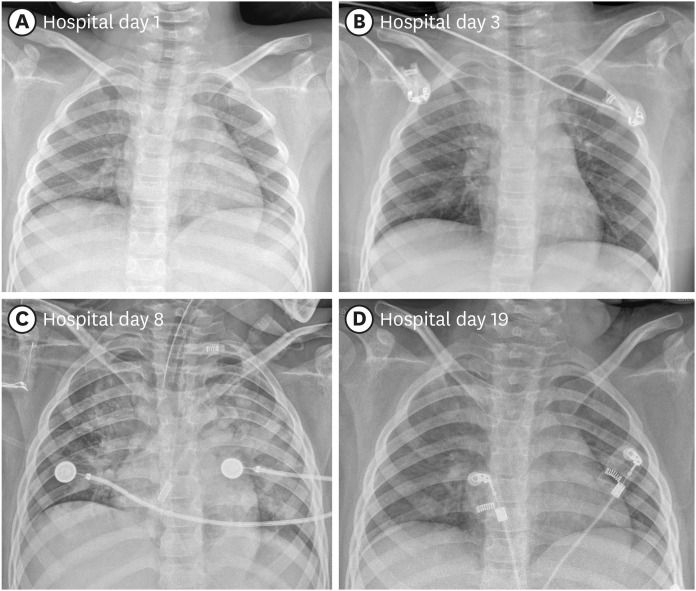J Korean Med Sci.
2022 Mar;37(10):e82. 10.3346/jkms.2022.37.e82.
A Case Report for Using Methylprednisolone for Severe ARDS Caused by SARS-CoV-2 Delta Variant in a Pediatric Patient With Lennox-Gastaut Syndrome
- Affiliations
-
- 1Department of Pediatrics, Jeonbuk National University Children’s Hospital, Jeonju, Korea
- 2Research Institute of Clinical Medicine of Jeonbuk National University, Jeonju, Korea
- KMID: 2526975
- DOI: http://doi.org/10.3346/jkms.2022.37.e82
Abstract
- The severe acute respiratory syndrome coronavirus 2 (SARS-CoV-2) resulted in the coronavirus disease 2019 (COVID-19) pandemic. COVID-19 can result in fatal comorbidities, including acute respiratory distress syndrome (ARDS). Several reports suggest that children have milder illness, though severe cases have still been reported. We report a 9-year-old boy with ARDS caused by the SARS-CoV-2 delta (B.1.617.2) variant. He was admitted to our hospital and carefully observed due to underlying Lennox-Gastaut syndrome. He developed intractable seizures with a high fever. Although the seizures were controlled, his respiratory condition deteriorated to severe ARDS. High-dose methylprednisolone was administered with high positive end-expiratory pressure and low tidal volume. After ARDS treatment, oxygenation improved sufficiently to permit extubation. This case suggests that close observation is required in pediatric patients with neurologic comorbidities because of an increased risk for severe COVID-19.
Keyword
Figure
Reference
-
1. World Health Organization. WHO coronavirus (COVID-19) dashboard. Updated 2021. Accessed August 18, 2021. https://covid19.who.int/ .2. Guan WJ, Ni ZY, Hu Y, Liang WH, Ou CQ, He JX, et al. Clinical characteristics of coronavirus disease 2019 in China. N Engl J Med. 2020; 382(18):1708–1720. PMID: 32109013.
Article3. Shen K, Yang Y, Wang T, Zhao D, Jiang Y, Jin R, et al. Diagnosis, treatment, and prevention of 2019 novel coronavirus infection in children: experts’ consensus statement. World J Pediatr. 2020; 16(3):223–231. PMID: 32034659.
Article4. Liguoro I, Pilotto C, Bonanni M, Ferrari ME, Pusiol A, Nocerino A, et al. SARS-COV-2 infection in children and newborns: a systematic review. Eur J Pediatr. 2020; 179(7):1029–1046. PMID: 32424745.
Article5. Jo YH, Hwang Y, Choi SH. A case report for severe COVID-19 in a 9-year-old child treated with remdesivir and dexamethasone. J Korean Med Sci. 2021; 36(29):e203. PMID: 34313036.
Article6. Jurado Hernández JL, Álvarez Orozco IF. COVID-19 in children: respiratory involvement and some differences with the adults. Front Pediatr. 2021; 9:622240. PMID: 33855003.
Article7. Sinaei R, Pezeshki S, Parvaresh S, Sinaei R. Why COVID-19 is less frequent and severe in children: a narrative review. World J Pediatr. 2021; 17(1):10–20. PMID: 32978651.
Article8. Korea Disease Control and Prevention Agency. Korea Disease Control and Prevention Agency (KDCA) dashboard. Updated 2021. Accessed August 25, 2021. http://www.kdca.go.kr/contents.es?mid=a20107040000 .9. Ranjbar K, Moghadami M, Mirahmadizadeh A, Fallahi MJ, Khaloo V, Shahriarirad R, et al. Methylprednisolone or dexamethasone, which one is superior corticosteroid in the treatment of hospitalized COVID-19 patients: a triple-blinded randomized controlled trial. BMC Infect Dis. 2021; 21(1):337. PMID: 33838657.
Article10. Pinzón MA, Ortiz S, Holguín H, Betancur JF, Cardona Arango D, Laniado H, et al. Dexamethasone vs methylprednisolone high dose for COVID-19 pneumonia. PLoS One. 2021; 16(5):e0252057. PMID: 34033648.
Article11. Edalatifard M, Akhtari M, Salehi M, Naderi Z, Jamshidi A, Mostafaei S, et al. Intravenous methylprednisolone pulse as a treatment for hospitalised severe COVID-19 patients: results from a randomised controlled clinical trial. Eur Respir J. 2020; 56(6):2002808. PMID: 32943404.
Article12. Meduri GU, Siemieniuk RA, Ness RA, Seyler SJ. Prolonged low-dose methylprednisolone treatment is highly effective in reducing duration of mechanical ventilation and mortality in patients with ARDS. J Intensive Care. 2018; 6(1):53. PMID: 30155260.
Article13. Meduri GU, Tolley EA, Chrousos GP, Stentz F. Prolonged methylprednisolone treatment suppresses systemic inflammation in patients with unresolving acute respiratory distress syndrome: evidence for inadequate endogenous glucocorticoid secretion and inflammation-induced immune cell resistance to glucocorticoids. Am J Respir Crit Care Med. 2002; 165(7):983–991. PMID: 11934726.
Article14. Cabezudo-García P, Ciano-Petersen NL, Mena-Vázquez N, Pons-Pons G, Castro-Sánchez MV, Serrano-Castro PJ. Incidence and case fatality rate of COVID-19 in patients with active epilepsy. Neurology. 2020; 95(10):e1417–e1425. PMID: 32554773.
Article
- Full Text Links
- Actions
-
Cited
- CITED
-
- Close
- Share
- Similar articles
-
- SARS-CoV-2 Delta (B.1.617.2) Variant: A Unique T478K Mutation in Receptor Binding Motif (RBM) of Spike Gene
- Kinetics of Neutralizing Antibody Responses Against SARS-CoV-2 Delta Variant in Patients Infected at the Beginning of the Pandemic
- Epidemiology, Virology, and Clinical Features of Severe Acute Respiratory Syndrome Coronavirus 2 (SARS-CoV-2; Coronavirus Disease-19)
- An Outbreak of Breakthrough Infections by the SARS-CoV-2 Delta Variant in a Psychiatric Closed Ward
- Epidemiology, virology, and clinical features of severe acute respiratory syndrome -coronavirus-2 (SARS-CoV-2; Coronavirus Disease-19)


